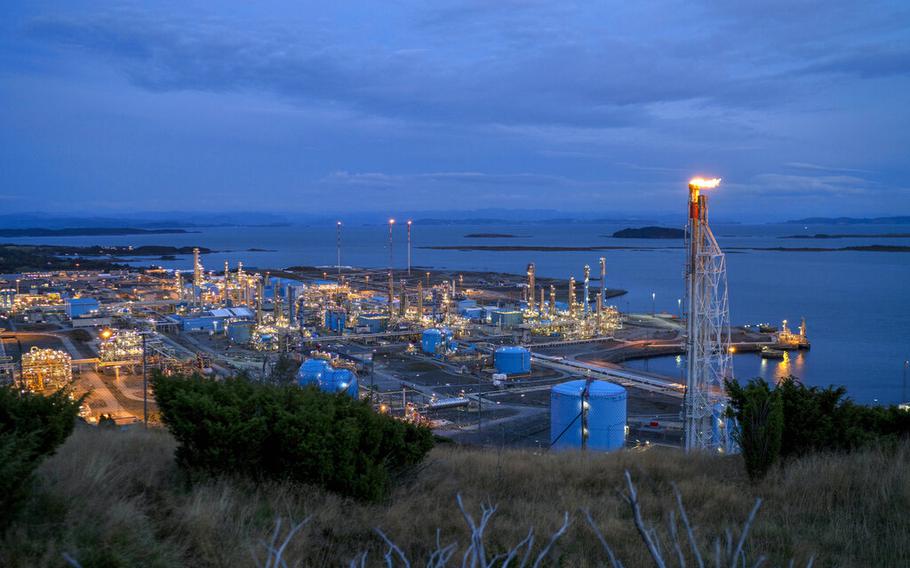
The Karsto processing plant in North Rogaland, Norway, is seen on Wednesday, Sept. 28, 2022. The suspected sabotage this week of two gas pipelines that tied Russia and Europe together is driving home how vital yet weakly protected undersea infrastructure is vulnerable to attack, with potentially catastrophic repercussions for the global economy. (Cornelius Poppe/NTB Scanpix)
The European Union plans to conduct a stress test of the physical security for key energy infrastructure as Norway said several European nations are sending help to safeguard its North Sea installations after the Nord Stream pipeline explosions.
EU Energy Commissioner Kadri Simson said Friday at a news conference that she will work with her home affairs counterpart, Ylva Johansson, to prepare the stress test plan as more countries begin to point the finger at Russia for sabotaging the pipelines.
"Given the possible serious impact of an incident on the internal market and across borders, an EU-wide approach is needed and we will work with member states to define the test scope and timing to reinforce the resilience of the EU energy system to threats," Simson said. She said the bloc will consider new policy measures to protect critical infrastructure.
The pipeline attacks sparked new fears that Russia may stage surreptitious attacks on vital energy pathways to spike prices in the already-stressed bloc as winter sets in.
"Everyone's shocked by the sabotage of Nord Stream so it was very fruitful that colleagues from Denmark, Sweden and Germany informed us on the way that they're doing research to know what happened over there," Dutch energy minister Rob Jetten told reporters after a meeting in Brussels. "And we exchanged how member states can protect this crucial infrastructure as well as possible."
Norway has accepted offers of assistance from Germany, France and the U.K. as it increases its presence around oil and gas installations in the North Sea, Prime Minister Jonas Gahr Store told reporters on Friday. It has redirected two of its coast guard vessels and a maritime surveillance aircraft to patrol the area, he said.
ConocoPhillips Skandinavia said Friday that it elevated the "security level and emergency preparedness for our offshore and onshore facilities" this week.
"We confirm having made drone observations and we cooperate with the authorities," the company said in a statement, adding that it won't disclose further details. TotalEnergies also said that it spotted an aerial drone close to an oil field in the Danish North Sea.
Countries have been reluctant to formally blame Russia since investigations haven't been possible while gas is still spewing from the ruptures, but Germany made clear that Moscow is the obvious suspect.
"Russia saying 'it wasn't us' is like saying 'I'm not the thief,'" German Economy Minister Robert Habeck told reporters Friday in Brussels. Russia has denied responsibility and President Vladimir Putin on Friday blamed "Anglo-Saxons" for the blasts, without providing any evidence.
The Danish Energy Agency said in a tweet that the company behind the Nord Stream pipelines has told it that Nord Stream 2 will stop leaking gas on Saturday while the Nord Stream 1 pipe will run out the next day.